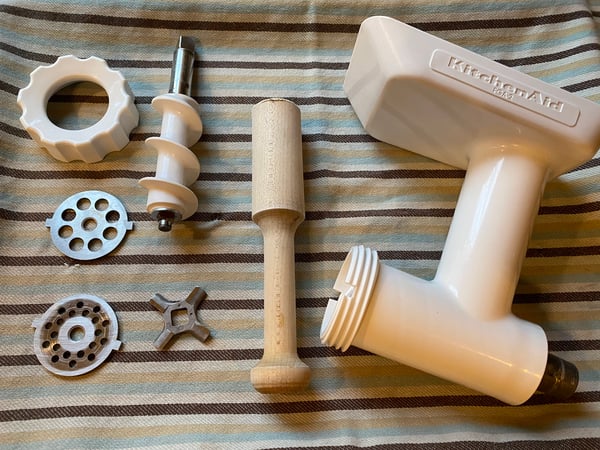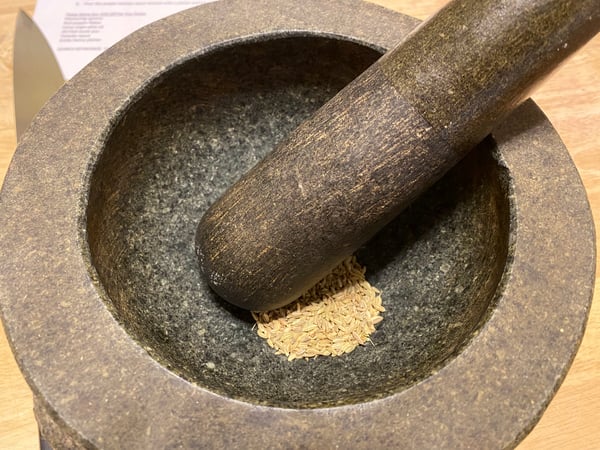Italian sausage is one of my favorite pork products, because it can be used in so many delicious applications from pasta sauce to meatballs, used as a pizza topping, added to stuffing or in stuffed peppers. The list can go on and on!
There are some pretty tasty options at the grocery store for Italian sausage, and I typically grab a package while shopping to keep on hand, but this time I set out on a journey to make my own from scratch. I’m talking about bulk Italian sausage here, and not the links. To make links, you need sausage casing and a tool called a sausage stuffer, so to keep this adventure of mine more approachable, I made the sausage without stuffing it into casings, which I think keeps it more versatile anyways.
The first step to making Italian sausage is to make sure you have the proper tools. Because you’ll be grinding your own meat, you’ll need a meat grinder (see all the KitchenAid meat grinder parts pictured below), or you can use a food processor to “grind” the meat. The texture will be a bit different, but it will still be delicious.

Boneless Pork Butt: This muscle comes from the shoulder and should be used for sausage making due to its ideal lean-to-fat ratio, which is about 70%-30%. It’s this fat that adds that juiciness to the sausage and prevents it from drying out when cooked. The extra fat also adds a bunch of flavor! Side note: You can use pre-ground pork to streamline, but that only contains about 20% fat and that extra 10% from the butt makes a really significant difference.
Spices and flavorings: I keep the seasoning for my sausage traditional by using a combination of crushed fennel seeds, sweet paprika, red pepper flakes, ground coriander, garlic, salt and pepper. This produces a “sweet” variety of sausage because of the addition of fennel seeds. You can use a mortar and pestle to lightly crush the fennel seeds, or simply rough chop them with your chef’s knife.

There are three steps to accomplishing this:
1. Cut your pork butt into long strips, place them on a sheet tray and set that tray in the freezer for about 30 minutes. This will firm up the fat ensuring it does not shmear.
Meat after second pass through grinder
3. To make sure all of the meat has passed through the grinder, do what the pros do. Take a piece of plastic wrap and thread it through the grinder. This will push any remaining meat through the plate without shredding the plastic. It’s a tried-and-true trick!
All that’s left is to mix in the spices and seasonings. To accomplish this step, use a spatula and not your hands to gently mix in the seasoning for easy cleanup and to keep the mixture cold.
Homemade Italian Sausage
Scroll down for a printable version of this recipe
Yield: 2 pounds
Active time: 1 hour
Start to finish: 1 hour
2 pounds boneless pork butt
3 teaspoons kosher salt
1 teaspoon black pepper
2 teaspoons fennel seeds, coarsely crushed
2 teaspoons sweet paprika
1/2 to 1 teaspoon red pepper flakes (optional)
1/2 teaspoon ground coriander
4 cloves garlic, finely minced
- Cut the pork butt into long strips and place them on a sheet tray. Set in the freezer for 30 minutes to chill the fat.
- While the pork is chilling, set up your meat grinder with the largest plate (biggest holes), and place a bowl under the grinder to catch the meat.
- If using a stand mixer attachment, set it on the highest speed, and feed each strip of cold pork through the grinder, using the plunger to help push the meat through. When done, feed a piece of plastic wrap through the grinder to ensure all of the pork has been pushed through.
- Place the bowl of coarsely ground pork in the refrigerator.
- While the pork is chilling, remove the plastic wrap and change the plate to the one with the smallest holes. Tip: Save this piece of plastic as you’ll use it one more time.
- Place another bowl or sheet tray under the grinder to catch the meat, and pass the coarsely ground pork through the small plate. Feed the piece of plastic through the grinder one more time.
- Using a spatula, mix in the salt, pepper, crushed fennel seeds, paprika, pepper flakes, coriander and garlic until thoroughly mixed.
- Use the sausage in pasta sauces, meatballs, as a pizza topping, in stiffed peppers, or any other place you would use Italian sausage.
Pork is the challenge for this week's private Facebook group. Join now, make a pork dish and share it with other home cooks!
Homemade Italian Sausage
Ingredients
- 2 pounds boneless pork butt
- 3 teaspoons kosher salt
- 1 teaspoon black pepper
- 2 teaspoons fennel seeds, coarsely crushed
- 2 teaspoons sweet paprika
- 1/2 to 1 teaspoon red pepper flakes (optional)
- 1/2 teaspoon ground coriander
- 4 cloves garlic, finely minced
Instructions
- Cut the pork butt into long strips and place them on a sheet tray. Set in the freezer for 30 minutes to chill the fat.
- While the pork is chilling, set up your meat grinder with the largest plate (biggest holes), and place a bowl under the grinder to catch the meat.
- If using a stand mixer attachment, set it on the highest speed, and feed each strip of cold pork through the grinder, using the plunger to help push the meat through. When done, feed a piece of plastic wrap through the grinder to ensure all of the pork has been pushed through.
- Place the bowl of coarsely ground pork in the refrigerator.
- While the pork is chilling, remove the plastic wrap and change the plate to the one with the smallest holes. Tip: Save this piece of plastic as you’ll use it one more time.
- Place another bowl or sheet tray under the grinder to catch the meat, and pass the coarsely ground pork through the small plate. Feed the piece of plastic through the grinder one more time.
- Using a spatula, mix in the salt, pepper, crushed fennel seeds, paprika, pepper flakes, coriander and garlic until thoroughly mixed.
- Use the sausage in pasta sauces, meatballs, as a pizza topping, in stiffed peppers, or any other place you would use Italian sausage.
